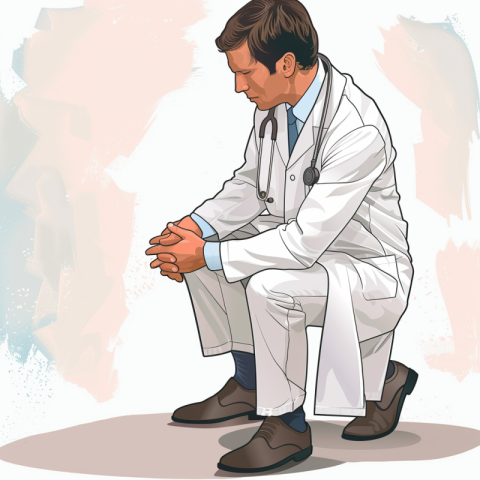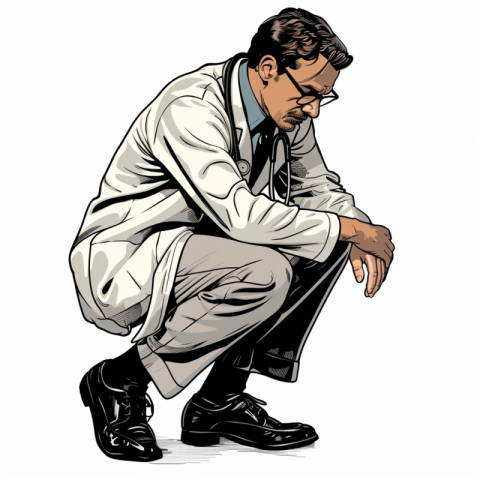











The Doctor: Healer, Diagnostician, and Advocate - A Pillar of Healthcare
Doctors, also known as physicians, are healthcare professionals who are trained to maintain or restore human health through the practice of medicine. They diagnose and treat illnesses and injuries, provide preventive care, and educate patients about maintaining a healthy lifestyle. Doctors play a vital role in society, working to alleviate suffering, improve quality of life, and advance medical knowledge. Their dedication, expertise, and compassion make them pillars of the healthcare system.
1. The Path to Becoming a Doctor: Education and Training
The journey to becoming a doctor is long and rigorous, requiring extensive education and training:
- Undergraduate Education: Aspiring doctors typically complete a four-year undergraduate degree, often in a science-related field, such as biology or pre-med. This also includes the MCAT (Medical College Admissions Test).
- Medical School: Doctors then attend a four-year medical school, where they receive a comprehensive education in the basic and clinical sciences. This culminates in either an M.D. (Doctor of Medicine) or D.O. (Doctor of Osteopathic Medicine) degree.
- Residency Training: After medical school, doctors complete a residency program in their chosen specialty, which can last from three to seven years or more. Residency provides hands-on clinical training under the supervision of experienced physicians.
- Fellowship Training (Optional): Some doctors choose to pursue further specialized training in a subspecialty through a fellowship program, which typically lasts one to three years.
- Licensing and Certification: Doctors must obtain a medical license to practice in their state or jurisdiction. They may also choose to become board-certified in their specialty, which involves passing a rigorous examination.
- Continuing Medical Education (CME): Doctors are required to participate in ongoing education and training throughout their careers to stay up-to-date with the latest medical advancements.
2. The Roles and Responsibilities of a Doctor: A Multifaceted Profession
Doctors have a wide range of responsibilities, which can vary depending on their specialty and practice setting:
- Diagnosing Illnesses and Injuries: Doctors use their knowledge and skills to diagnose medical conditions based on patient history, physical examination, and diagnostic tests.
- Developing Treatment Plans: They create individualized treatment plans for patients, which may include medication, surgery, therapy, lifestyle changes, or other interventions.
- Performing Medical Procedures: Doctors may perform a variety of medical procedures, from routine physical exams to complex surgical operations.
- Prescribing Medications: They prescribe medications to treat illnesses and manage symptoms.
- Monitoring Patient Progress: Doctors regularly monitor their patients' progress and adjust treatment plans as needed.
- Providing Preventive Care: They offer preventive care services, such as vaccinations, screenings, and counseling on healthy lifestyle choices.
- Educating Patients: Doctors educate patients about their medical conditions, treatment options, and self-care strategies.
- Counseling and Supporting Patients: They provide emotional support and counseling to patients and their families, particularly during times of illness or stress.
- Collaborating with Other Healthcare Professionals: Doctors often work as part of a healthcare team, collaborating with nurses, therapists, specialists, and other professionals to provide comprehensive patient care.
- Conducting Research: Some doctors participate in medical research to advance scientific knowledge and develop new treatments.
- Advocating for Patients: They may advocate for their patients' needs within the healthcare system and beyond.
3. Medical Specialties: A Diverse Field of Expertise
Doctors can specialize in a wide range of medical fields, each focusing on a specific area of the body, disease, or patient population:
- Primary Care Physicians: Doctors who provide general medical care to patients of all ages.
- Family Medicine: Care for patients of all ages.
- Internal Medicine: Focus on adult medicine.
- Pediatrics: Specialize in the care of infants, children, and adolescents.
- Geriatrics: Focus on the healthcare of older adults.
- Specialists: Doctors who have advanced training in a particular area of medicine.
- Cardiologist: Heart and blood vessel diseases.
- Oncologist: Cancer diagnosis and treatment.
- Neurologist: Disorders of the brain, spinal cord, and nervous system.
- Dermatologist: Skin, hair, and nail conditions.
- Gastroenterologist: Digestive system disorders.
- Endocrinologist: Hormonal disorders.
- Psychiatrist: Mental health conditions.
- Surgeon: Performs surgical procedures. (See previous entry for more details on different surgical specialties).
- Anesthesiologist: Administers anesthesia during surgery and other procedures.
- Radiologist: Interprets medical images, such as X-rays, CT scans, and MRIs.
- Pathologist: Diagnoses diseases by examining tissues and cells under a microscope.
- Many other specialties and subspecialties exist within medicine.
4. The Doctor-Patient Relationship: A Foundation of Trust and Communication
The doctor-patient relationship is a cornerstone of effective healthcare:
- Trust: Patients need to trust their doctors to provide competent and compassionate care.
- Communication: Open and honest communication between doctors and patients is essential for accurate diagnosis, effective treatment, and shared decision-making.
- Empathy and Compassion: Doctors need to be able to empathize with their patients' experiences and provide compassionate care.
- Respect: Doctors should respect their patients' autonomy, values, and beliefs.
- Confidentiality: Doctors are bound by ethical and legal obligations to maintain patient confidentiality.
5. Challenges Facing Doctors: Stress, Burnout, and Systemic Issues
Doctors face numerous challenges in today's healthcare environment:
- Heavy Workloads: Many doctors work long hours and have demanding schedules.
- Administrative Burden: Doctors often spend a significant amount of time on paperwork, insurance claims, and other administrative tasks.
- Burnout: The combination of heavy workloads, administrative burdens, and emotional stress can lead to burnout, a state of emotional, physical, and mental exhaustion.
- Malpractice Concerns: The fear of lawsuits can be a source of stress for doctors.
- Healthcare System Issues: Doctors may face challenges related to healthcare access, insurance coverage, and reimbursement policies.
- Keeping up with Advancements: It can be difficult to keep up with the constant advancements in the medical field.
6. The Evolution of the Medical Profession: Technological Advancements
The medical profession is constantly evolving, driven by advancements in technology and scientific knowledge:
- Electronic Health Records (EHRs): EHRs have transformed the way medical information is stored, accessed, and shared.
- Telemedicine: The use of technology to provide healthcare remotely, such as through video consultations, is increasing access to care, particularly in rural areas.
- Artificial Intelligence (AI): AI is being used to develop new diagnostic tools, personalize treatment plans, and improve the efficiency of healthcare delivery.
- Genomics and Personalized Medicine: Advances in genomics are leading to more personalized approaches to medicine, tailoring treatments to individual patients based on their genetic makeup.
- Minimally Invasive Surgery: These surgical techniques are becoming increasingly common, reducing pain and recovery times for patients.
7. The Future of Doctors and Medicine
- The role of doctors is likely to continue to evolve as technology advances and the healthcare landscape changes.
- Doctors will increasingly rely on technology to aid in diagnosis, treatment, and patient care.
- There will be a growing emphasis on preventive care and population health.
- The demand for doctors is expected to continue to grow as the population ages and the need for healthcare services increases.
8. Ethical Considerations in Medicine: Guiding Principles
Doctors are bound by a code of ethics that guides their professional conduct:
- Beneficence: Acting in the best interests of the patient.
- Non-maleficence: "First, do no harm." Avoiding actions that could harm the patient.
- Autonomy: Respecting the patient's right to make decisions about their own healthcare.
- Justice: Fairly distributing healthcare resources and ensuring equitable access to care.
- Confidentiality: Protecting the privacy of patient information.
- Informed Consent: Ensuring that patients understand the risks, benefits, and alternatives to medical procedures before making decisions.
9. Medical Research: Advancing Knowledge and Treatment
Many doctors are involved in medical research, contributing to the advancement of scientific knowledge and the development of new treatments:
- Clinical Trials: Doctors may participate in clinical trials, research studies that evaluate the safety and effectiveness of new drugs, medical devices, or other interventions.
- Basic Science Research: Some doctors conduct laboratory research to investigate the underlying causes of diseases and to develop new therapies.
- Epidemiological Research: Doctors may study the patterns and causes of diseases in populations.
- Translational Research: This type of research aims to translate findings from basic science research into clinical practice.
10. Global Health and Doctors: Addressing Health Disparities
Doctors play a crucial role in addressing global health challenges:
- Doctors Without Borders (Médecins Sans Frontières): A well-known international organization that provides medical care in emergency situations, such as natural disasters and conflicts.
- Many doctors volunteer their time and expertise to provide medical care in developing countries or underserved communities.
- Doctors are involved in public health initiatives to prevent the spread of infectious diseases and to promote health education.
- They may also work to improve healthcare infrastructure.
11. The Doctor's Role in Public Health: Promoting Community Well-being
Doctors contribute to public health in various ways:
- Disease Prevention: Doctors educate patients about healthy lifestyle choices, administer vaccinations, and screen for diseases.
- Health Promotion: They promote healthy behaviors, such as proper nutrition, exercise, and avoiding tobacco use.
- Epidemiology: Some doctors specialize in epidemiology, the study of the distribution and determinants of health-related states or events in specified populations. 1 1. www.tga.gov.au
www.tga.gov.au - Public Health Policy: Doctors may be involved in developing and advocating for public health policies.
12. Different types of Degrees: Doctor of Medicine (M.D.) vs. Doctor of Osteopathic Medicine (D.O.)
- M.D.s and D.O.s are both fully licensed physicians, trained to diagnose and treat illnesses and injuries. The path to each degree is very similar, and both are required to complete accredited medical school programs, residencies, and licensing exams.
- M.D.s are trained in allopathic medicine, which is the classical form of medicine that focuses on diagnosing and treating diseases.
- D.O.s are trained in osteopathic medicine, which emphasizes a whole-person approach to care and includes training in osteopathic manipulative medicine (OMM), a hands-on technique used to diagnose and treat musculoskeletal problems.
- In practice, the differences between M.D.s and D.O.s are often subtle, and both types of physicians provide high-quality medical care. Many D.O.s practice similarly to M.D.s and may not regularly use OMM.
13. The Rise of Physician Assistants (PAs) and Nurse Practitioners (NPs)
- PAs and NPs are healthcare professionals who work collaboratively with doctors to provide medical care. They can perform many of the same tasks as doctors, including examining patients, diagnosing illnesses, ordering tests, and prescribing medications. They are becoming increasingly important in helping to meet the growing demand for healthcare services.
- PAs are trained in a medical model similar to doctors and must be supervised by a physician, though the level of supervision varies by state and practice setting.
- NPs are registered nurses with advanced education and clinical training. They can often practice independently, depending on state regulations.
14. The Doctor's Role in an Aging Population
- As the population ages, the demand for healthcare services, particularly geriatric care, is increasing. Doctors specializing in geriatrics play a crucial role in managing the complex health needs of older adults.
- Doctors are also involved in providing end-of-life care and helping patients and families make difficult decisions about treatment options.
15. The Doctor's Role During a Pandemic
- Doctors are on the front lines of public health crises, such as pandemics. They play a critical role in diagnosing and treating patients, as well as in educating the public about preventive measures.
- Doctors also contribute to research efforts to develop vaccines, treatments, and public health strategies to combat pandemics.
- The COVID-19 pandemic highlighted the crucial role of doctors and other healthcare professionals in responding to global health emergencies.
Conclusion:
Doctors are highly skilled and dedicated professionals who play an indispensable role in maintaining and improving human health. Their extensive training, diverse expertise, and unwavering commitment to patient care make them pillars of the healthcare system. From the intimate setting of the doctor-patient relationship to the broader context of public health and global health initiatives, doctors make a profound difference in the lives of individuals and communities around the world. As medicine continues to advance and the healthcare landscape evolves, doctors will remain at the forefront, adapting to new challenges and embracing new opportunities to heal, to discover, and to advocate for the well-being of all.
Top Keywords on Google:
Doctor, physician, medical doctor, doctor specialties, primary care physician, cardiologist, oncologist, neurologist, dermatologist, gastroenterologist, psychiatrist, surgeon, anesthesiologist, radiologist, pathologist, medical school, residency training, medical license, board certification, doctor-patient relationship, medical ethics, medical research, clinical trials, global health, public health, telemedicine, electronic health records, artificial intelligence in medicine, personalized medicine, becoming a doctor, doctor salary, doctor shortage, find a doctor near me, doctor appointment, doctor online, virtual doctor visit, Doctor of Medicine (M.D.), Doctor of Osteopathic Medicine (D.O.), physician assistant (PA), nurse practitioner (NP).

